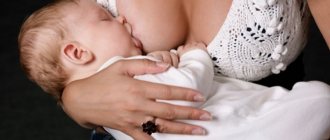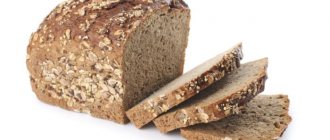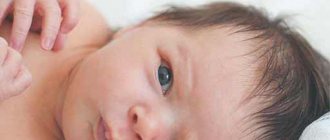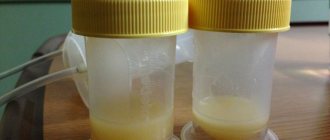Runny nose, cough, increased body temperature - such symptoms will not please anyone, but their appearance causes particular concern in a nursing mother. In this case, the woman finds herself in a difficult position: she is afraid of infecting the baby with “sick” milk, but at the same time, lactation does not allow her to take most medications for colds. What to do? Wean your baby from the breast and be cured faster with potent drugs or fight a cold with traditional methods, but not interrupt breastfeeding? Look for answers to these questions in our article.
Is it possible to breastfeed if you have a cold?
Breast milk is a storehouse of useful substances for the baby, because it contains all the proteins, fats, carbohydrates and vitamins that the child’s body needs for proper development.
Doctors recommend continuing to breastfeed a baby for as long as possible, at least up to a year, because not even the most popular milk formula can compare in composition with mother’s milk.
Many women, especially those who became mothers for the first time, having caught the virus and become ill, worry about whether it is possible to breastfeed the child and often act independently, stopping feeding or reducing the frequency of putting the child to the breast or transferring him to artificial nutrition, without receiving specialist permission.
When treating a viral disease of a nursing mother, doctors categorically prohibit stopping breastfeeding, even despite her illness, but only if the treatment does not involve taking pills, which absolutely cannot be used during lactation.
Colds, unless, of course, a bacterial infection is added to them, are almost never treated with antibiotics, for this reason there is no reason to stop breastfeeding.
When visiting a doctor, a woman must inform him that she is breastfeeding her baby, and then the specialist will be able to choose the treatment that suits her. It should also be noted that breastfeeding during a cold is considered beneficial for a child, because along with milk he receives antibodies that resist the virus.
Important! When a child is deliberately transferred to artificial feeding, the load on his immune system and psyche increases, since it is difficult for an infant to experience separation from the breast and thus a decrease in physical contact with his mother. During this period of time, his body is especially at risk of disease.
Lactation for other conditions in the mother
Many people are interested in whether it is possible to feed a child if the mother has diarrhea, because loss of fluid and feeding can have a bad effect on the mother’s well-being.
Breastfeeding mothers with diarrhea may be afraid of infecting their babies and worry about whether they can continue breastfeeding while sick. Fortunately, diarrhea usually goes away on its own within a few days with simple at-home care measures, and continued breastfeeding may actually protect your baby from contracting infectious causes of diarrhea.
Diarrhea is very common and occurs for a variety of reasons. A few weeks after giving birth, diarrhea may be caused by using laxatives to relieve postpartum constipation. There may also be stress due to the arrival of a newborn in the house. Diarrhea is most often caused by a virus that infects the intestines and usually lasts two to three days. But diarrhea can also occur due to: allergies to certain foods, medications, foods, bacterial infection, or other infections.
When you're dealing with diarrhea, you may experience bloating and pain, loose and watery stools, an urgent need to go to the bathroom, and possibly nausea. None of these common causes of diarrhea pose a problem in terms of continuing to breastfeed your baby. During lactation, a mother may also develop infectious gastroenteritis, the most common cause of sporadic diarrhea in adults. Most cases are viral, although bacteria and parasites can also cause gastroenteritis. The organisms responsible for infectious gastroenteritis cannot be passed to your baby through breast milk. So you don't have to worry about breastfeeding giving your baby an infection. In fact, breastfeeding reduces your baby's risk of contracting infectious gastroenteritis.
Viral gastroenteritis does not usually require any medication and usually goes away on its own within a few days. Therefore, there are no objective reasons to stop lactation.
Maintaining adequate fluid intake for a mom with diarrhea is a major concern if you are breastfeeding. Infectious diarrhea usually causes watery diarrhea, which can lead to dehydration. Inadequate hydration can cause dizziness, especially when standing up after sitting. This could pose a safety hazard to you and your baby if you accidentally fall.
Although it is important for you to increase your fluid intake to replace the water lost due to diarrhea, your breast milk is unlikely to be affected unless you are severely dehydrated. Infectious diarrhea can also make you feel tired, so it's important to get as much rest as possible
For example, napping with your baby will allow you to rest and breastfeed without getting out of bed.
However, you must not forget about precautions, because if it is viral diarrhea, you must prevent transmission to the child. Wash your hands with soap and water after using the bathroom and before preparing food to avoid spreading infectious gastroenteritis to others in your household, including your child.
In most cases, diarrhea resolves on its own and does not pose a significant risk to the health of the mother or her baby.
Changing your diet is the easiest and most natural way to treat diarrhea while breastfeeding. Eat probiotic foods like yogurt or kefir. Some types of dairy products are good for diarrhea and upset stomach. Live bacteria known as probiotics, found in yogurt and kefir (fermented milk drink), can replace the healthy bacteria normally found in your digestive tract that is lost due to diarrhea.
Can a baby catch a cold from its mother?
The virus is transmitted by airborne droplets or through direct contact with a carrier of the disease. Even small children who have not yet acquired a strong immune system are no exception. If a nursing mother has a cold, the disease can spread to the baby, but not through breastfeeding.
How to recognize and treat staphylococcus in the mouth?
In order to protect the baby, you need to follow basic rules: do wet cleaning, ventilate the apartment and put on a bandage at every contact. It is necessary to continue breastfeeding for your own health and for the benefit of the baby, but only if antibiotics are not prescribed for treatment, which are on the list of prohibitions for mothers feeding their children with milk.
In order to reduce the risk of infection of a child, it is recommended to consider and follow certain rules:
- Determine the time for taking medications and feeding the baby so that a sufficient amount of time passes between them, namely 1.5-2 hours;
- Increase the time between feedings to 4.5 hours. In this case, you will have to use the mixture as a supplement, and express excess milk to prevent the development of lactostasis, which can develop into mastitis;
- Breastfeeding must be stopped if the baby has an allergic reaction or swelling, and then be sure to show him to a doctor.
Recommended video:
How to treat a cold and combine breastfeeding?
Breastfeeding during a cold should be carried out according to the child’s usual schedule. If you follow preventive measures, you can protect your child from infection.
Most often, the body of a healthy adult person copes with a cold on its own, without the use of medication. To do this, you need to maintain bed rest and peace of mind, then the immune system will cope on its own. Of course, for a mother of an infant it is quite difficult to follow these recommendations and she cannot do it without outside help.
Colds need to be treated promptly, and treatment methods depend on the symptoms:
- If your temperature rises, you can take a paracetamol tablet; it is safe for a nursing mother.
- You can treat a cold with folk remedies : if you are bothered by a cough and sore throat, you can gargle with chamomile or sage decoctions, drink hot milk with butter. It is better not to use herbal teas and decoctions internally, as there is a high risk of developing allergic reactions.
- You can take safe cough syrups, but only after consulting your doctor.
- If you have a runny nose, rinse your nose more often with a soda-salt solution, which you can prepare at home: dissolve a spoonful of salt and a spoonful of baking soda in a liter of water. You can also use onion or garlic water for instillation. Among pharmaceutical preparations, you can use Pinosol and Aquamaris.
- Remember to eat well and drink plenty of fluids.
When treatment does not bring relief and the condition worsens, call a doctor! Perhaps it is not a cold, but a more serious illness.
You should only stop breastfeeding when serious treatment is needed. Your doctor will warn you about this.

Prevention measures
During the period of illness, there remains a high risk of infection for the child and other household members, so it is important to follow preventive measures to protect your loved ones, but especially the baby. So:
- Whenever you have contact with a child, use a gauze bandage that covers the nose and mouth. The bandage needs to be changed every 3-4 hours, but if it gets wet, it needs to be replaced immediately;
- To avoid the accumulation of germs in the room, it is necessary to ventilate the room every hour;
- After each touch of your mouth or nose, you must wash your hands thoroughly with soap, this is especially true if the mother has herpes on her lip. Instead of soap, you can use a bottle of antiseptic.
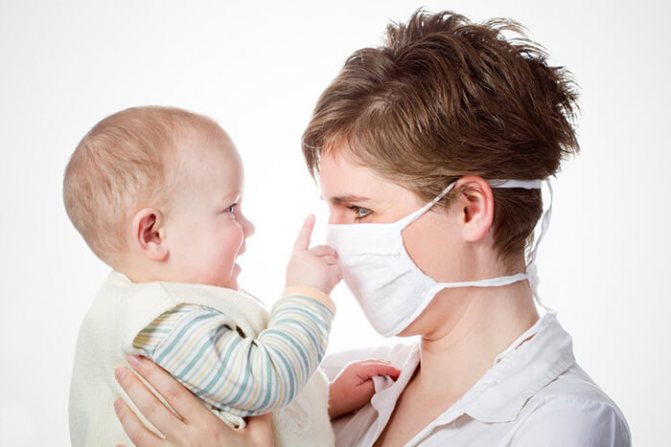
What to do to avoid infecting a child?
The fact that a cold is not transmitted through breast milk does not mean that the baby has no chance of acquiring the infection. If there is constant contact between a sick mother and baby, a protective mask alone will not help, and in order not to infect the newborn, you should follow certain rules:
- The most effective method is considered to be isolation of the sick person, but if it is the mother, then in the first months of the baby’s life this is excluded;
- The sleep of the child and the infected mother should definitely be separate; it is better to put the baby to sleep in a separate room or at least in his own crib;
- everything that the baby touches must be carefully treated and washed: sterilize nipples and bottles, feed from separate dishes, wash clothes separately from adult clothes, wash toys periodically;
- in the absence of a child in the room, be sure to ventilate the room, monitor the temperature and humidity;
- if the mother is ill, do not stop walking with the baby outside, dad or grandmother can walk with the child even in cloudy weather, moist air is also good for the baby;
- periodically wipe dust in places where the baby spends the most time;
- there is no need to wrap up the child, you need to dress the baby like yourself, so that it is comfortable, but not hot;
- If possible, avoid staying in public places during a wave of diseases and do not invite guests to your home if someone is sick in the house;
- use a gauze bandage not only for the sick, but also for all family members;
- It would not be amiss to quartz or diffuse aromatic oils, for example, conifers, as well as the smell of onions and garlic - this will help kill microbes;
- It is worth monitoring the hygienic toilet of the baby and parents, washing hands and face more often;
- During illness, it is better to replace ordinary drinking water with fruit drinks or drinks with healthy additives - rose hips, honey, lemon or ginger;
- during an epidemic, it is recommended to use drugs to increase immunity, so before going for a walk, mom can use Oxolinic ointment;
- You need to constantly monitor the child’s health, and if a runny nose appears, take appropriate measures immediately.

Sticking to bed rest is one of the most useful and difficult actions to take if ARVI during lactation takes you by surprise.
Will breast milk spoil if you have a cold?
The well-established opinion that during a woman’s illness, her breast milk can deteriorate has long been refuted by pediatricians. If she does not take drugs prohibited for the lactation period to treat the disease, then the milk cannot be harmful to the baby and will not turn sour.
Moreover, during this period there is no need to express, much less boil, expressed breast milk, since boiling destroys all the beneficial substances.
Important! Breastfeeding can be dangerous only if the mother does not listen to pediatricians and self-medicates, using various drugs, without even knowing whether they are prohibited.
What causes meningitis and why is it dangerous?
Cough and runny nose in mother during breastfeeding

Inhalation therapy through a nebulizer with saline or saline solutions can also help ease breathing. This also eliminates dryness, sore throat and dry cough. Decoctions of herbs - chamomile, sage, eucalyptus - can help. We recommend reading: Herbal treatment for a runny nose
If there is severe congestion, drops based on xylometazoline in sprays or drops help; they can be used for no longer than 3-4 days and only in the severe stage of a runny nose. Against the background of congestion and swelling, pinosol with an oil solution of medicinal herbs helps. It is indicated for thick green mucus, along with Bactroban ointment or Polydex or Isofra.
For dry cough, inhalation with saline or ambroxol, taking ACC and sputum thinners are useful.
note
Bromhexine and drugs based on it are prohibited for nursing mothers.
Herbal preparations will be useful - gedelix, bronchicum, breast elixir, anise drops.
For a sore throat, gargling with salt, soda and a drop of iodine, herbal decoctions or preparations hexoral, miramistin, rotokan will be useful. You can also use sprays with antimicrobial and anti-inflammatory properties (Tantum Verde, Yox, Srepsils-plus solution, Bioparox). All of them are used strictly according to the instructions and in agreement with the doctor.
Alena Paretskaya, pediatrician, medical columnist
13, total, today
( 177 votes, average: 4.62 out of 5)
Toxoplasmosis during pregnancy: treatment, diagnosis, risks and consequences for the child
32 weeks of pregnancy: what happens to the fetus and how does the woman feel?
Related Posts
Can mom take medications?
When treating a cold for a nursing mother, many drugs are prohibited, so any use of medications must be agreed upon with a therapist. When self-medicating, there is a high risk of harming yourself and your child. So what can be treated?
Antiviral drugs are used to treat acute respiratory viral infections and acute respiratory infections, but it must immediately be clarified that most drugs are prohibited for a mother who is breastfeeding. Among the approved drugs, the most effective ones should be highlighted:
- "Aflubin";
- "Grippferon";
- "Oscillococcinum"
If a high temperature rises during illness, there is a need to take antipyretic medications.
These medications, of course, are undesirable for a woman whose baby is breastfed, but it is necessary to reduce the temperature, especially if it lasts for a long time, but before you start taking it, you should try the folk recipe - wiping the bite with a weak solution, and the procedure must be done before until the mark on the thermometer drops to 37 and 5 degrees.
If this method turns out to be unpromising, you can take special syrups for babies:
- "Panadol";
- "Nurofen"
Important! High body temperature can contribute to complete loss of breast milk.
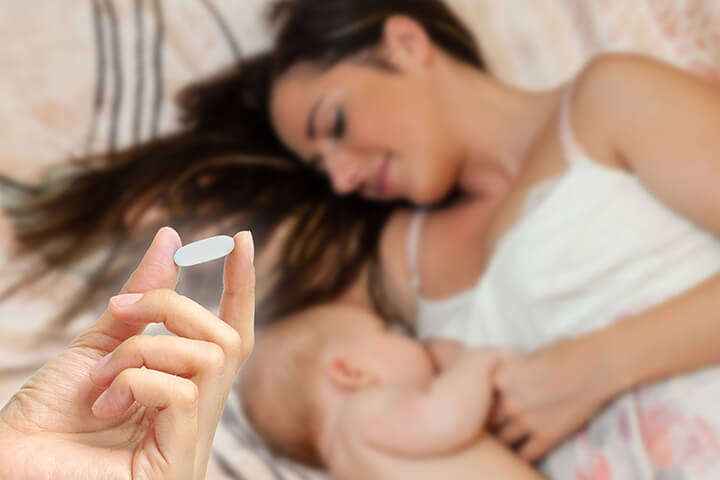
When treating a runny nose, a woman can use sea salt-based nasal decongestants.
If a woman is afraid to resort to drug treatment, then you can pay attention to traditional medicine. It is only worth noting that folk remedies have one drawback: the mother and, accordingly, the child may experience an allergic reaction.
Treatment methods for acute respiratory viral infections in breastfeeding women
It is important not to let the infection take its course, and to begin active treatment measures immediately, without waiting for the condition to worsen and complications to form. It is important to consult a doctor, since self-medication, especially by taking certain medications, can harm both the mother and her baby
In the treatment of ARVI, both traditional, non-drug methods and medications traditionally used in the treatment of colds are acceptable.
Among the non-medicinal methods, drinking plenty of warm drinks will be useful - tea with lemon, raspberries, honey or milk with butter, warm still mineral water. You need to rest as much as possible and spend more time in bed during periods of illness and fever. Cupping and mustard plasters have no proven effectiveness, and are currently not recommended for the treatment of nursing mothers. Foot baths with mustard and taking a bath with injuries will be useful for a runny nose and lack of fever.
Antiviral drugs for acute respiratory viral infections in nursing mothers
The use of drugs such as arbidol, ribovirin, kagocel and others for ARVI in nursing women is not indicated. Their effectiveness and safety in nursing have not yet been confirmed, although they are widely advertised and promoted by manufacturers. Their effect on infants and their complete safety have not been studied, therefore only certain drugs are used strictly as prescribed by a doctor.
It is also dangerous to use such widely used drugs as Immunal, Aflubin - which can cause allergic reactions in infants, digestive disorders and anxiety.
Interferon inducers, used both topically in the form of nasal drops and systemically - anaferon, gripperon and similar agents, can help in treatment. They are used strictly according to the instructions and under the control of the baby’s condition. Viferon or kipferon in candles will be useful, stimulating your own immunity to fight the virus.
Antibiotics for the treatment of acute respiratory viral infections in nursing mothers
Antibiotics are not used in the treatment of ARVI; they do not affect the reproduction and activity of viruses, but can lead to negative reactions from the body of a woman and child due to their penetration into breast milk.
Important
Antibiotics are used strictly as prescribed by a doctor in the presence of complications or severe ARVI with high fever, which lasts 4-5 days or more, without a tendency to decrease.
Antibiotics are indicated in the presence of complications such as otitis media, sinusitis, sinusitis, bronchitis and the risk of pneumonia, strictly with the doctor's permission and taking into account their compatibility with breastfeeding. Tetracyclines, aminoglycosides and biseptol are strictly prohibited. If, for special indications, it is necessary to take antibiotics that are incompatible with breastfeeding, the child is temporarily transferred to expressed milk or formula.
Symptomatic treatment for ARVI in nursing mothers
The most basic problem is the fight against high temperature during hepatitis B.
If you have a fever, you need to drink plenty of fluids and use physical methods of cooling - light clothing, wiping with a damp cloth and water at room temperature, cool compresses to large vessels (elbows, knees, armpits) and forehead.
To reduce the temperature, we can take linden blossom, a decoction of birch buds, chamomile tea and raspberries. The house requires frequent ventilation, low temperature in the rooms and wet cleaning, air humidification of at least 55-60%. This helps not only in reducing the temperature, but also in facilitating nasal breathing, easing sore throat and cough.
What to do at a temperature of 38?
Paracetamol is recommended as the main remedy, but in serious circumstances, take any antipyretic or decoctions of medicinal herbs that have a similar effect. These are linden blossom, currant leaves, mint, hibiscus, willow bark, raspberries, cranberry juice.
Drinking for a cold
A prerequisite for recovery. This is a way to minimize intoxication, prevent dehydration of the body, and introduce valuable components into it that stimulate natural resistance to the aggressor. You need to drink not only water, but also compotes, decoctions, fruit drinks, homemade or freshly squeezed juices (with the exception of citrus fruits, which can cause allergies in the baby).
Features of the treatment of colds in the first month after childbirth
After childbirth, a weakened body is especially often susceptible to the action of pathogenic agents, but the use of folk remedies during this period should be carried out with extreme caution. Herbal preparations can cause an allergic reaction in the baby
Honey, recommended as a panacea, can also serve as a powerful allergen. Any drugs can be used only after medical approval.
When should you absolutely not feed?
If the body is severely intoxicated, breastfeeding should be stopped, as well as when taking strong medications to treat inflammation. If you continue to feed, there is a risk of harm to the baby's health.
If the temperature during illness does not rise above 38 degrees, then you need to continue feeding for the benefit of your baby, but if the temperature rises higher and higher, then the quality and consistency of mother's milk deteriorates significantly.
It is forbidden to feed the baby if the woman is taking antibiotics to treat the disease. Thus, if this type of drug enters the body, it can cause complications in the form of dysbacteriosis, which will negatively affect the child’s health.
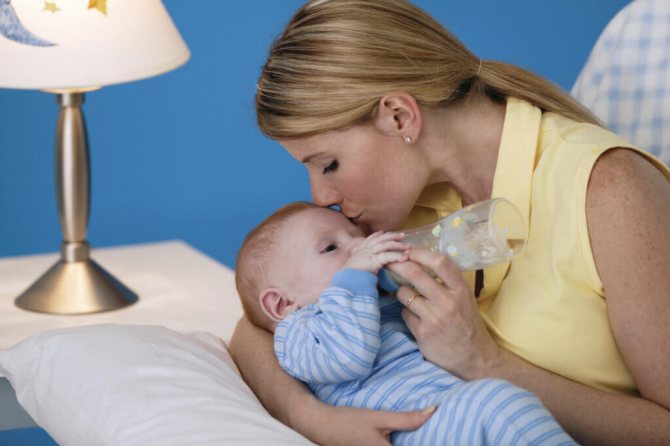
Continuing feeding is also prohibited in case of the following diseases:
- Infectious diseases that occur in an acute form, since toxic substances can get into the milk;
- Purulent mastitis;
- It is forbidden to feed the child after surgery if anesthesia was used, as well as strong medications, including antibiotics.
Feeding and antibiotics
If a viral infection is accompanied by a bacterial one, complications arise in the form of pneumonia, sore throat, and otitis media. In such cases, antibiotics must be used. But this does not mean that breastfeeding should be stopped. There are medications that are approved for breastfeeding, unless, of course, there are special indications. Be sure to consult your doctor!
After any viral infection, specific immunity is developed, but it does not save us from the next cold, since it will be caused by a completely different strain of the virus. But you shouldn’t despair, because your experiences are always passed on to your baby!
Start treatment on time, do not delay your visit to the doctor. Constantly strengthen your immune system: try to get enough sleep whenever possible! Eat right, be sure to walk in the fresh air with your baby.
This will fill you two with positive emotions and make you resistant to diseases!
VIFERON Suppositories help alleviate the course of the disease, cope with symptoms and reduce the likelihood of complications. The original formula of the drug, containing interferon and highly active antioxidants, blocks the virus and restores the immune system. Thanks to its convenient release form, VIFERON acts gently without causing a negative effect on the stomach. It is approved for use by children from the first days of life and by expectant mothers from the 14th week of pregnancy, as well as during breastfeeding.
How to light a candle for a child? Step-by-step video instructions and tips for moms
THERE ARE CONTRAINDICATIONS. SPECIALIST CONSULTATION IS REQUIRED.
What to do if a nursing mother shows signs of a cold?
Timely treatment allows the mother to get rid of the virus in a short time and not give up breastfeeding. A woman needs:
- If you feel unwell, immediately seek help from a doctor who will identify the cold and prescribe competent treatment for the mother, which will not negatively affect the health of the baby;
- It is highly not recommended to express and boil breast milk and then give it to the baby to drink, since after processing it loses its properties. If your health allows, then you should continue to put the baby to your breast;
- If, nevertheless, the baby catches an infection and catches a cold, then there is no need to give him additional medications; those contained in the breast milk that the mother will feed him will be enough;
- Medicines that contain aspirin should be taken with extreme caution, since this drug causes metabolic disorders in mother and child;
- Analgesics should also be on the “stop” list, due to the fact that they have a strong effect on the child’s psyche. You should also avoid medications that contain bromhexine;
- All medications must be taken strictly in accordance with the prescribed dose;
Desquamative glossitis - treatment, prevention, complications and prognosis
Important! If the mother has a serious illness and feeding becomes impossible, then it is necessary to express milk from the breast every 4 hours to exclude disease of the mammary glands.
Recommended video:
Not enough milk! The baby is starving!
This phrase is very often uttered by young mothers, not at all because modern women have become less capable of breastfeeding. It’s just that mothers in some places are not entirely objective, sometimes they panic out of nowhere.
Noticing the baby’s predisposition to frequent meals, the nursing woman suddenly decides that she has “liquid milk” or simply doesn’t have enough of it. And he begins to improve the situation. How? She decides to feed the baby with formula or even milk from a cow or goat. And there are those who believe that it is best to feed the baby with... thin semolina porridge.
Meanwhile, the baby may require the breast not only for food. This is how he communicates with his mom. And the sucking reflex does its job. The baby takes the nipple into his mouth, sucks a little, and falls asleep. He is comfortable and calm. In this case, do not panic and make a diagnosis of lack of milk yourself. And even more so, there is no need to feed the baby.
Important! Only a specialist, after careful observation, can decide how much additional nutrition the baby needs.
Improperly organized complementary feeding stimulates a decrease in lactation and inhibits the instinct to suck the breast. Formula is sweeter than breast milk, so the baby may even refuse to breastfeed after such complementary feeding.
Should you feed a child who has a cold?
Children under one year of age rarely get sick, but there are still situations when the baby gets sick, so many mothers wonder whether they should breastfeed their child or wait until the body copes with the virus and, for this purpose, reduce the frequency of breastfeeding.
The child's illness should not affect the frequency of attachment. You only need to take into account the child’s health status, so if he has a stuffy nose, then it will be physically difficult for him to drink milk from the breast for a long time and therefore the feeding regime will need to be reconsidered.
It is also worth reconsidering the feeding position if the baby has a stuffy nose. In this case, it is advisable to lift it to a vertical position to free up the nasal passages.
Do not underestimate the role of the female body. So, when the baby is sick, the woman’s body begins to produce even more substances that help defeat the disease. This feature also protects the woman, who will be able to continue caring for her child without fear of becoming infected.
Thus, treating a cold and breastfeeding a child have become completely compatible things, therefore, when the first symptoms of a cold are detected, you should not stop feeding the child, because this will harm him more.
Correctly selected treatment by a doctor will allow the mother to recover in the coming days, and the child will continue to enjoy such nutritious and tasty mother’s milk.
Menu for a nursing mother: what you can eat and what you should avoid
A woman who has taken on the responsibility of breastfeeding her baby should know that the calorie content of her daily diet should now be 450-500 calories higher than usual. In addition, a nursing mother needs at least 2-2.5 liters of fluid per day.
Allowed products for it:
- cereals;
- pasta;
- bread;
- fruits and vegetables;
- lean meat;
- dairy products.
Consumption of sweets should be limited within reasonable limits. That is, you don’t need to completely give up such a pleasure as eating candy with a cup of tea, but it will be better if it is 1-2 caramels rather than a chocolate bar. It’s even healthier to replace sugar, candy or cream cake with dry fruit.
It is best to consume vegetables and fruits that do not contain coarse fiber. These are apples and pears, berries, pumpkin and zucchini, cauliflower, carrots. It is necessary to reduce the consumption of regular fresh cabbage, beets, and cucumbers.
Important! Strawberries, wild strawberries and raspberries in a mother’s diet can cause diathesis in the baby. Breastfeeding women should use these berries with caution. Grapes cause strong fermentation in the baby’s intestines – you should avoid them completely. But raisins are very useful.
Preferably dietary meat: poultry, rabbit, lamb, beef. The liver is especially useful. You can only eat lean pork.
Store-bought chicken also often causes allergies in children. Therefore, you need to carefully introduce dishes from it into your diet in the fall. It is best to buy country birds from suppliers who feed them with natural products and check them for diseases from veterinarians.
Eggs and fish can also serve as allergens. Therefore, over a period of about 2 days, you can eat very little of any one “test product” and monitor the baby’s reaction to it. If no changes are noted in the baby’s skin or behavior, the portion can be increased. Then test for reaction with another product in the same way.
Breastfeeding women should absolutely not consume carbonated drinks, fast food, processed foods, or canned food. It is also advisable to refuse imported vegetables and fruits - they are usually treated with harmful substances for longer storage. And fruits that are unusual for this natural area are for the most part the cause of serious eating disorders and skin rashes.
Naturally, those foods that cause discomfort in the intestines of the woman herself almost always give the same reaction, but stronger, to the baby.

